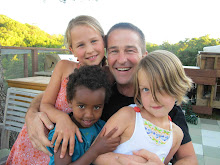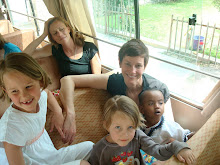Our family vacation this summer, beyond the handful of two or three day camping trips in Scout (the trailer has now been christened), is a week at a family camp in Mendocino County. Emandal is a working farm and has seen families come and go for over a hundred summers. The majority of the food consumed by campers is grown right there outside the farmhouse. It is some of the most delicious cuisine I’ve ever had the pleasure of sampling; organic vegetables, homemade bread, granola, yogurt and farm-roasted coffee. In my normal neo-hippy existence, I eschue wheat, dairy, and sugar. Here I have a glass of milk and at least two baked goods with every meal. I plan to gain at least five pounds.
There is no cell service here and limited internet. I haven’t had any contact with the outside world for days and won’t for days more. Cars are unloaded at the 100-year-old cabins and then parked far from view, given a week’s rest. Wallets sleep next to I-phones on the shelf. There’s nothing to buy.
Activities include milking the cow, collecting eggs, picking berries for pies, helping harvest vegetables for dinner, loafing under the apple trees and swimming in the river that snakes through the property. The kids are running free, visiting the rescue kittens up for adoption (if we make it out of here without a kitten, I will be impressed by our parental resolve), catching lizards, visiting sheep and goats and llamas and ostriches, enjoying a bit of independence in this helicopter age. Unlike other family camps, there is no tie-dying, basket-weaving or lanyard construction. Children are left to roam, to create their own fun. They’re given the chance to be bored which is where the delight really begins.
We are here with our friends Elizabeth and Ben, which, as all the other times we’ve vacationed with them, makes for fun introductions. “My name is Liz and this is my friend, Elizabeth. That guy over there with the cowboy hat is her Ben. That one, with the brown boy on his shoulders, is my Ben.” Lana and their son, Hugo, friends from the womb, several times married, have been busy shucking corn and smashing basil for pesto. Hugo’s four-year-old brother, Axel, and Mihiretu are yin and yang, Axel wearing a crown of white curls, Mihiretu with his own riotous brown halo, Axel mellow and contemplative, Mihiretu fierce and ever-moving. Mihiretu, now dubbed “Mr. Yang”, has taken up competitive farming; “Azel, I got mo’ bewies than you,” as he plops raspberries in his cup or “Azel, you no have appoes. I got lots a appoes,” as he places apple after apple in his aproned t-shirt. Mae has (thank god) discovered another nine-year-old girl. Together they spend hours petting kitties (“I like Squeak best, I think. No, maybe Maryanne. No, no, Ginger.”) and “running the rapids” down at the river, which consists of boarding an inner-tube and traveling the ten feet of slightly faster running water. I am getting out for a daily early morning run in a meager effort to counteract the mass calorie consumption, kicking up dust on the long dirt road back to modern life. Ben is riding his bike. I’m actually reading a book while my children are present, a never-before-heard-of achievement.
The kids, ever enterprising, have started a business. It’s called “The Riverside Spa” and it’s located on the shore opposite the main beach at the swimming hole. Mae is the motor of the ferry, a blow-up yellow vinyl raft. She entices clients at the beach, generally adults, lures them into the boat and swims them across. Her new friend, Ariel, sits behind the clients and massages their shoulders as they travel. Once at the spa, Lana, Mihiretu, and Axel start the treatments. The first treatment is free, a “sampler” (these kids know their marketing). Options include exfoliation, which entails gravely sand scrubbed into any available skin. There is also temple massage, which could be dangerous, were the kids better at their anatomy. The temple, according to these small masseurs, is on the cheekbone or the jawbone or, if they’re really having an off day, the elbow. Mae administered a “hot rock treatment” by dropping a sun-warmed stone in Ariel’s dad’s shorts. He had hot rocks, indeed. Hugo, meanwhile, is the manager. He collects payment in shells and secrets them away in his safe, a small opening beneath a mound of boulders, a prime spot for a rattlesnake if you ask me (he hasn’t). He has fired and rehired Lana, his assistant manager. Lana, in turn, has fired and rehired Mae. Mae, the lowly ferry-boat captain, is watching her step.
Last night there was a sing-a-long at the campfire, Ben (Elizabeth’s, not mine) on the guitar. Songs ranged from “Dinah Blow Your Horn” (which my Ben quietly changed to “Dinah Blow My Horn”) to Leonard Cohen’s “Hallelujah” and finally, delightedly, to “Blister in the Sun”. Lana, after days of practice, performed a solo, her own version of “I Could Have Danced All Night.” She long ago learned the words from a songbook and has composed her own melody, which Ben graciously accompanied. It was beautiful, really. I prefer her version to Rogers and Hammerstein.
Mr. Yang is, generally speaking, a pleasure in this environment. For the most part, we are outside, Mihiretu’s preferred habitat. There is little structure, few rules to follow. He happily shadows his sisters and friends from berry bush to cow. He has become, almost without me noticing, a fairly normal four-year-old. Yes, there’s some yelling, minor tantrums, but nothing that every other four-year-old present isn’t guilty of. No longer are we the unwilling center of attention, the eye of Hurricane Mihiretu. The only semi-stressful periods are mealtimes. He insists on sitting next to me – I love his attachment, it was hard earned, but I could use a little elbow-room. He eats with his hands unless strictly guided to his fork, he uses my dress as a napkin, he chucks half-chewed mouthfuls on my plate if he doesn’t care for something. He shouts “Done!” and grabs his plate and glass and heads for the “magic window”, the portal into the kitchen, utensils dropping noisily to the floor. But then, and here is the essence of the beauty of this place, he goes outside. The kids congregate in the apple orchard, speaking their age-old kid language. They run free and we adults sit at the table and “dine” as Ben’s dad terms it. We sip our coffee and pick at our plates. We talk.
Next week we start school, we dive back into routine. I’m happy for it. Summer is delicious in so many ways; hours of swimming, picnicking at the farmer’s market, free in cotton dresses and flip-flops. It’s also intense; limited childcare, no schedule to cling to, waking each morning to “What are we doing today?” We find out on Friday who the girls have for teachers, which friends are in their classes. It’s exciting. But it’s also so delectable to have this last long week of summer vacation, these slow-paced, food-centered, dual-parented days outside, so very conscious of how lucky we are to be here in this small Eden, snuggling kitties, tucking in to yet another giant farm meal, together, all day every day.
Life here is much as it must have been in 1908, the year the farm was founded by Em and Al. This farm has seen a lot of young families, those long-ago children now parents to other children roaming the rows of corn. It points out our relative youth. The kids are little but won’t always be. Ben and I are young and strong and as beautiful as we’ll ever be. It lends a sepia tone to our time here. Yes, we, too, will age. The kids will grow more and more independent until finally they are out in the world. They need us now, sometimes desperately, but that won’t always be the case. It makes me want to take a mental picture (I’m ridiculously negligent in taking actual ones), to freeze these images, the five of us floating down the river in inner-tubes in the hot afternoon stillness, leaping from boulders into the green deep, Lana shrieking in fear of the fish.
There’s a scene in the play “Our Town” in which Emily, now dead, revisits an ordinary morning of her girlhood. Her mother hustles around the farm kitchen, readying breakfast, shouting to her children to get ready for school while Emily grasps her mother’s arms, tries to still her, desperate to connect, knowing how fleeting this time is. “Oh, Mama,” she says, “Look at me one moment as if you really saw me. Let’s really look at one another!”
There’s something about this time of year, as summer shifts towards fall, that is melancholy. The prime of the season, the bounty of the harvest, is almost behind us. Ahead of us is the dying of the year. I love the shift, I love change, I suppose, but it is tender, it is sweetly painful. We are always changing. Always losing something. Always coming into something new.
Someone else is making lunch, so I’m free to gaze at my children; Lana on a blanket under a tree working Legos with Hugo, Mae lovingly carrying a turtle she found on the trail back through the farm to the river, Mihiretu high on Ben’s shoulders grasping for apples. I can see them, truly see them, in this changing late-summer, early-autumn light.
Sunday, August 21, 2011
Subscribe to:
Post Comments (Atom)






































Hi Liz!
ReplyDeleteThis is my second try at sending you a nice response to your wonderful blog. It seems they want you to set up your own blog just to post a comment to yours...hope this one reaches you!
In any event, I loved reading about the camp through your eyes and was delighted to learn how well your family is thriving! The photos are fantastic! What a fabulous diary you are creating for your children!
Hope the kids got the teachers they wanted!
Bet you're glad to have them back in school!
With love to you and Ben and kids! Carol